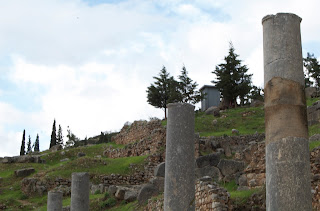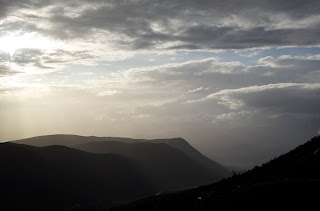The first Sunday back after Greece and Bulgaria (November 22nd) had a focus on the Christian Communities in Jerusalem. We went to the roof of the Church of the Holy Sepulcher, then we went into the Church.
Views From Outside and on top of the Church of the Holy Seplucher



 We also went to visit the Armenian quarter in the Old City. We went into the church there, and watched a service. The Armenian church is more of a monastery, there are male students who study to become priests and they live in this secluded building. Even the church is only open for less than an hour each day, during the time of their afternoon prayer. The church was beautiful though (pictures weren't allowed so I'll have to describe it). It had these big huge domed ceilings and these hanging lanterns or something along those lines everywhere. Each lantern was hung on this pulley system and the heights could be adjusted at any point. There were these huge columns with portraits of saints all over. And this little nooks along the sides with candles. After seeing the church we met with the high priest of the Armenian community. He was pretty interesting albeit fairly right wing and stuck in his ways. He was actually American, and he had come to the monastery as a man in his twenties and ended up devoting his life to the church. In the Armenian church there are two different types of priests. One who devotes his entire life to the church, lives in a portion of the monastery and practices celibacy. The other is one who has a family, and a home, but is still a priest in the community. I am unclear as to the different roles of the two priests. The man we met was of the former type, and one of the most remarkable characteristics was this huge amethyst, diamond and gold ring that is given to the priests by the High Church upon reaching a certain level of priesthood.
We also went to visit the Armenian quarter in the Old City. We went into the church there, and watched a service. The Armenian church is more of a monastery, there are male students who study to become priests and they live in this secluded building. Even the church is only open for less than an hour each day, during the time of their afternoon prayer. The church was beautiful though (pictures weren't allowed so I'll have to describe it). It had these big huge domed ceilings and these hanging lanterns or something along those lines everywhere. Each lantern was hung on this pulley system and the heights could be adjusted at any point. There were these huge columns with portraits of saints all over. And this little nooks along the sides with candles. After seeing the church we met with the high priest of the Armenian community. He was pretty interesting albeit fairly right wing and stuck in his ways. He was actually American, and he had come to the monastery as a man in his twenties and ended up devoting his life to the church. In the Armenian church there are two different types of priests. One who devotes his entire life to the church, lives in a portion of the monastery and practices celibacy. The other is one who has a family, and a home, but is still a priest in the community. I am unclear as to the different roles of the two priests. The man we met was of the former type, and one of the most remarkable characteristics was this huge amethyst, diamond and gold ring that is given to the priests by the High Church upon reaching a certain level of priesthood.The next Sunday we spent with artist Tobi Kahn. Tobi Kahn is a painter/sculptor who comes every year to Kivunim to help organize and curate an art show. Towards the end of the year (in May) in Jerusalem there will be a Kivunim art show with pictures taken by the students. Tobi oversees the production, selection and set up of the show. Any student who want to help him is able to. We woke up at 4:30 that morning and walked into the old city to watch the sun rise. It was a pretty remarkable sight. We spent several hours watching the light change in and around the old city. From there we went to the Supreme Court building, the architecture there is incredible, then to the Israel Museum and the sculpture garden and then finally to a neighborhood right around the Jewish Shuk in Jerusalem. It was pretty cool because a lot of us had never been to these places. We didn't have to listen to guides talk at us, we got to go around and see things for ourselves and take pictures.
First Light around the Old City

This past Sunday we spent the day focusing on the issue of the Arab-Israeli conflict. More specifically the West Bank, The Green Line and the security fence. We went to Givat Haviva, which is an institute committed to the education on this conflict and trying to come to a solution for shared citizenship (apparently the term co-existence is now politically incorrect. You may not know, but that idea and more specifically that phrase is a huge part of Kivunim's philosophy and mission statement, so there were chuckles when the woman talking to us told us that the new term is shared citizenship). After being at this center we went to several places that exemplified this issue. We went to the West Bank, we saw a town that was literally divided in half by the Green Line and we saw, from a distance the security fence. It was interesting, although to be honest, I got somewhat geographically confused when we stopped time after time after time.
The Following Two are from the top of a roof overlooking the town divided by the Green Line















































